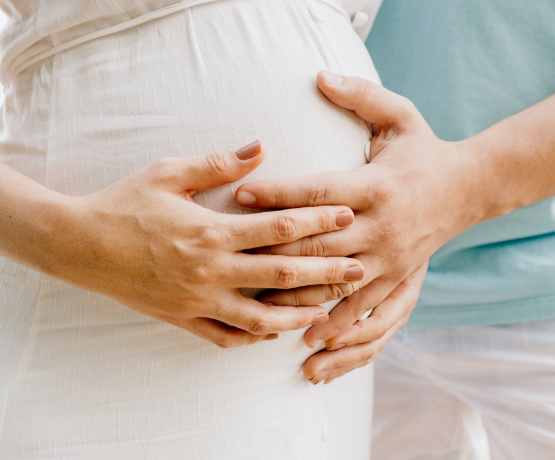Natural ways to bring Vitamin D into your diet
What do these three ingredients have in common: salmon, eggs, and mushrooms? Aside from making a hearty quiche, they’re also some of the best ways to naturally consume vitamin D. In this week’s article, we’ll explore why vitamin D is an essential nutrient to boost your fertility and improve your chances of conceiving. Research has shown that Vitamin D is essential for reproductive health in both men and women.
Ovulation and Hormone Regulation
Vitamin D is involved in the regulation of hormones, particularly in women. It helps in the production of follicle-stimulating hormone (FSH), which is crucial for regulating ovulation. It affects the production and function of hormones involved in the menstrual cycle as well, such as the aforementioned FSH and luteinizing hormone (LH). This works because vitamin D receptors are present in the ovaries, and vitamin D influences the growth and maturation of ovarian follicles. Adequate Vitamin D levels support healthy follicular development, which is essential for ovulation.
Vitamin D helps maintain a balanced ratio of FSH to LH, which is critical for a well-timed and successful ovulation. An imbalance in these hormones can lead to irregular menstrual cycles and ovulatory dysfunction.
Vitamin D also plays a role in hormone regulation beyond the menstrual cycle, such as with insulin resistance, which can disrupt hormonal balance and negatively impact fertility, especially in conditions like polycystic ovary syndrome (PCOS). Vitamin D supports insulin sensitivity, which can help manage conditions like PCOS.
Vitamin D has been shown to influence the synthesis and metabolism of sex hormones, including estrogen and progesterone. This influence is important for the regulation of the menstrual cycle and overall reproductive health.
A balanced immune system is essential for a successful pregnancy. Vitamin D helps modulate the immune response and can prevent immune-related disruptions to ovulation and implantation.
Finally, chronic inflammation can interfere with hormonal balance and ovulation. Vitamin D has anti-inflammatory properties and can help reduce inflammation in the reproductive system, promoting a healthy environment for conception. There’s more on this below.
Dr. Christina and I are committed to providing comprehensive care that addresses more than just fertility concerns. Our approach respects conventional medicine with functional and holistic strategies to get to the root cause of your health issues. If you are looking for functional medicine support in your journey to pregnancy click here to watch our on-demand webinar, where we reveal the 4R Fertility Formula™ we use to work with our clients. If what we share sounds good, we invite you to apply for a spot in our high-touch group program that has over an 80% success rate in helping couples conceive naturally.
Vitamin D and Sperm Health
For men, Vitamin D is essential for maintaining optimal sperm quality. It can positively impact sperm count, motility, and morphology. Low levels of this have been associated with male infertility.
Sperm Count, Motility, and Shape
Vitamin D is known to have a positive impact on sperm count. Low levels of Vitamin D have been associated with a decreased sperm count. Ensuring sufficient Vitamin D levels can help maintain a healthy sperm production process in the testes.
Sperm motility, or the ability of sperm to swim effectively, is crucial for fertility. Vitamin D plays a role in enhancing sperm motility, ensuring that sperm are better equipped to reach and fertilize the egg.
The shape and structure of sperm, known as morphology, are essential for successful fertilization. Vitamin D has been linked to improved sperm morphology, which contributes to higher fertility potential.
Vitamin D also possesses antioxidant properties. Oxidative stress can damage sperm DNA and reduce fertility. Vitamin D’s antioxidant effects can help protect sperm from oxidative damage.
Balancing the Male Hormones
Vitamin D helps regulate hormones in the male reproductive system. It supports the proper functioning of the testes, where testosterone is produced. Balanced testosterone levels are essential for sperm production and overall reproductive health.
Immune Health and Vitamin D
A strong immune system is necessary to protect sperm from damage and ensure their healthy development. Vitamin D boosts the immune system’s function, helping to safeguard sperm against harmful factors.
Vitamin D is essential for the proper functioning of various immune cells, including T cells and macrophages. These cells play a pivotal role in identifying and defending against pathogens, such as viruses and bacteria. Adequate Vitamin D levels support the optimal functioning of these immune cells.
Vitamin D has been associated with a reduced risk of respiratory infections, including the common cold and influenza. It helps the body produce antimicrobial peptides, which are natural antibiotics that can help combat infections.
Related to autoimmunity, vitamin D may play a role in modulating the immune response in autoimmune disorders, such as multiple sclerosis, rheumatoid arthritis, and lupus. It can help regulate the immune system’s response, potentially reducing the severity of autoimmune symptoms.
Vitamin D is of particular interest in respiratory health, as it has been associated with a lower risk of respiratory tract infections. This is especially relevant in the context of lung health and the prevention of conditions like pneumonia.
Immune Memory and Response
Vitamin D plays a role in the development of immune memory, which is essential for a strong and long-lasting immune response. This memory can help the immune system recognize and respond more effectively to previously encountered pathogens.
It’s important to note that maintaining adequate Vitamin D levels is crucial for immune system support. Vitamin D deficiency has been linked to an increased susceptibility to infections and a compromised immune defense. As such, monitoring and optimizing Vitamin D levels through dietary sources, supplements, or sensible sun exposure is a valuable part of maintaining a strong immune system.
Inflammation Control
Chronic inflammation can interfere with fertility. Vitamin D has anti-inflammatory properties and can help mitigate inflammation in the reproductive system. Vitamin D possesses anti-inflammatory properties, which means it has the ability to reduce excessive inflammation in the body. Inflammation is a natural response to injury or infection, but chronic inflammation can contribute to various health issues, including autoimmune diseases, cardiovascular diseases, and metabolic disorders.
Inflammatory Diseases and Cardiovascular Health
Vitamin D has been studied in the context of various inflammatory diseases, including rheumatoid arthritis, multiple sclerosis, and inflammatory bowel disease. While it may not be a cure, maintaining adequate Vitamin D levels can help manage the symptoms and reduce the severity of these conditions.
Chronic inflammation is a key factor in the development of cardiovascular diseases. Vitamin D’s anti-inflammatory effects can contribute to better heart health by reducing inflammation in blood vessels and tissues.
It’s important to maintain an appropriate balance of inflammation in the body. While acute inflammation is a necessary response to injury or infection, chronic inflammation can be detrimental to health. Adequate Vitamin D levels, obtained through sunlight exposure, dietary sources, or supplements, can contribute to this balance by helping to control excessive inflammation.
Vitamin D and Egg Implantation
Vitamin D has been associated with improved embryo implantation in the uterine lining. Adequate Vitamin D levels may promote a more receptive environment for the fertilized egg to attach to the uterine wall, increasing the chances of a successful implantation.
It also plays a role in hormonal balance, which is essential for maintaining a healthy menstrual cycle and reproductive function. Balanced hormones, including estrogen and progesterone, are important for optimal egg maturation and preparation for implantation. With sufficient Vitamin D levels during pregnancy, there is an associated reduced risk of complications such as gestational diabetes, preeclampsia, and preterm birth. These conditions can affect the success and outcome of pregnancy.
It’s essential for women who are trying to conceive and those who are already pregnant to maintain appropriate Vitamin D levels. This can be achieved through sunlight exposure, dietary sources, or supplements, depending on individual needs.
At Reimagined Health, we recognize the significance of Vitamin D in the journey to conception and a healthy pregnancy. We often incorporate Vitamin D assessment as part of our comprehensive evaluations and recommend interventions to optimize Vitamin D levels to support egg implantation and pregnancy success. Each client’s unique needs and circumstances are taken into consideration for personalized care.
Adding Vitamin D Naturally Through Diet
In Functional Medicine, food is medicine. Adding key nutrients, like vitamin D, into your diet by eating whole foods that are naturally high in such vitamins and minerals is an essential first step. Here are some ways to incorporate Vitamin D into your daily eating habits:
Fatty Fish
- Salmon: Wild-caught salmon is an excellent source of Vitamin D. A 3.5-ounce (100-gram) serving can provide up to 570 IU (International Units) of Vitamin D.
- Mackerel: Mackerel is another fatty fish rich in Vitamin D, with approximately 360 IU per 3.5-ounce serving.
- Sardines: Canned sardines, including the bones, are a great source of Vitamin D, providing around 272 IU per 3.5-ounce serving.
Cod Liver Oil
- Cod liver oil is one of the most concentrated sources of Vitamin D. Just one tablespoon can supply more than 1,300 IU of Vitamin D.
Egg Yolks
- Egg yolks contain Vitamin D, with one large egg yolk providing approximately 40 IU. It’s worth noting that the Vitamin D content can vary depending on the chicken’s diet.
Beef Liver
- Beef liver is a good source of various nutrients, including Vitamin D. A 3.5-ounce serving of beef liver can contain around 50 IU of Vitamin D.
Cheese
- Some types of cheese, like Swiss and cheddar, contain small amounts of Vitamin D, typically around 10 IU per ounce.
Mushrooms
- Certain mushrooms, such as maitake and shiitake, can naturally produce Vitamin D when exposed to sunlight or ultraviolet (UV) light. The Vitamin D content can vary but may provide up to 400 IU per 3.5-ounce serving.
Fortified Foods
- Many foods are fortified with Vitamin D, especially in regions with limited sunlight during certain seasons. Common fortified foods include milk, orange juice, and breakfast cereals. The amount of Vitamin D in fortified foods can vary, so it’s essential to check the labels for specific amounts. Some brands of tofu are even fortified with Vitamin D, providing around 120 IU per 3.5-ounce serving.
It’s important to note that while these foods contain Vitamin D, achieving adequate Vitamin D levels through diet alone may be challenging for some individuals, especially those with limited sun exposure. In such cases, Vitamin D supplements may be recommended to meet daily requirements.
At Reimagined Health, we encourage our clients to maintain a well-balanced diet that includes these Vitamin D-rich foods and to consider supplementation when necessary to ensure optimal Vitamin D levels, especially for those with specific health concerns or limited sun exposure.
Final Thoughts
It’s important to note that while Vitamin D is essential, excessive supplementation can be harmful. We encourage assessing Vitamin D levels through blood tests and then working with a healthcare provider to determine the appropriate supplementation, if necessary.
At Reimagined Health, we incorporate comprehensive assessments of nutritional status, including Vitamin D levels, into our approach to natural fertility. Each patient is unique, and personalized care is the key to optimizing fertility naturally.








